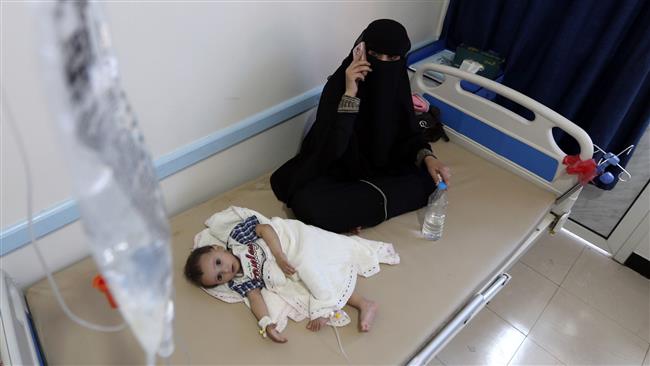
RNA - The attack killed and injured a number of people at the facility in the Sa’ada Province, Yemen’s al-Masirah television network reported, citing the province’s health authority.
The epidemic has claimed the lives of 605 Yemenis, 40 percent of whom were children.
UN envoy to Yemen Ismail Ould Cheikh Ahmed (seen below) said on Tuesday that only “less than 45 percent” of medical facilities in the country were functioning.
The disease brings along severe diarrhea, which can kill those afflicted within hours if not treated properly. Malnourished children are especially susceptible.
In March 2015, the Saudi regime and its allies, backed by the US, began a military campaign against Yemen to reinstall its former government. The war has killed over 12,000 civilians since then.
The invasion has been compounded by a Saudi blockade of the country. Back in May, the UN’s children fund reported an unprecedented increase in the number of suspected cholera cases across the country, and said many of those affected were children.
“Yemen has one of the world’s highest number of acutely malnourished children. Public services are on the brink of collapse,” the UNICEF warned, saying, “Anyone with a heart for children cannot let the situation in Yemen continue!”
Attempts at ceasefire have all failed so far on the back of repeated Saudi violations.
On Saturday, the UNICEF said the outbreak was claiming a suspected 3,000 to 5,000 Yemenis every day. Geert Cappelaere, the body’s Middle East director, said in an interview with The Associated Press that 70,000 suspected cases of cholera had been reported in the past month in 19 of Yemen's 22 provinces.
He voiced his concern that cholera cases could double every two weeks -- to 130,000 and then about 300,000 cases -- unless more aid is delivered. The official warned that the outbreak might "spread beyond Yemen" and perturb all states neighboring Yemen where a Saudi war is now in its third year.
"It is sad today, but we hope the cholera outbreak will be the turning point in turning people's attention to Yemen," he said. "Cholera is not going to be stopped by any border."
Yemen counterattacks
Cappelaere said the outbreak is the latest horror faced by Yemeni children alongside growing starvation. "Yemen is one of the worst places in the world to be a child," he said.
The Saudi war has killed more than 10,000 people, displaced 3 million others and devastated the country's health sector and economy. Cappelaere said many patients could not afford to travel to free clinics.
Houthi fighters and their allies have been staging counterattacks in the face of the Saudi incursion. On Saturday, a number of Saudi troops were killed in the kingdom’s southwestern region of Najran, which borders Yemen. The reprisal attack, which had targeted a military outpost, also forced the rest of the troops stationed there to flee.
Houthis further killed dozens of Saudi-backed militants near the Nihm District in Sana’a Province, according to the al-Masirah television channel.
They also downed a Saudi drone over the Dhubab District of Taiz Province in southwestern Yemen, it added.
Saudi-backed militants meanwhile fought to capture a Houthi-held presidential palace in the southwestern province of Ta'izz after clashes that killed 27 people, medics and military sources said.
A statement on Saudi Arabia's official SPA news agency said militants loyal to former president Abd Rabbuh Mansour Hadi had captured the palace but military sources on the ground denied this.
847/940